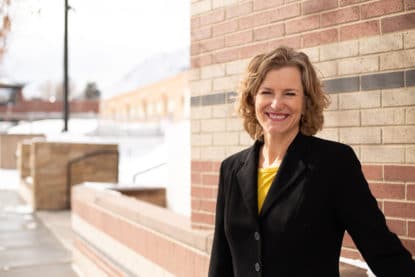A Crucible Moment
By Carrie Besnette Hauser
December 1, 2020

Certain dates resonate with us, historically, culturally, and personally. These dates often remind us that history is the greatest teacher of leadership, but that the future is limited only by our imagination, ingenuity, and resolve.
On this day, December 1, in 1862, Abraham Lincoln delivered a message to a despondent Congress to recommit itself to solving the most pressing challenges facing a deeply divided nation.
In his address, Lincoln did not attempt to sidestep the difficulty of the task at hand or its significance. He said to Congress, “The occasion is piled high with difficulty, and we must rise with the occasion. As our case is new, so we must think anew, and act anew. We must disenthrall ourselves, and then we shall save our country.”
Though he was eager to end the conflict quickly, it would be another three long years until Lincoln and the U.S. Congress would reunite and rebuild the nation. Lucky for all of us still benefitting from their efforts, they embraced the challenge and got to work.
On this December 1, our nation is not engaged in a civil war, but 2020 has important parallels to the situation more than a century and a half ago. As the recent election shows, our nation is divided on a number of economic and social issues. Our economy is slumped, certain industries are dying, and the benefits of our progress are concentrated in some states and among the powerful elite. Perhaps most insidious (and aided by social media), our citizenry has formed deeply entrenched identity groups that divide us from each other based on race, education, religion, socioeconomic status, and other factors, as was the case in 1862 (and 1962 and 2002).
And yet, in spite of these demanding conditions, I remain hopeful for the future of our country and of our state and its mountain communities.
December 1 is always an important personal day for me. Seven years ago, I joined the remarkable team at Colorado Mountain College. In most years, one’s work anniversary is cause for reflection, gratitude, and contemplation. However, this is not a year to celebrate or ruminate on a particular milestone. Instead, my entire attention is focused on the future and the ways CMC can continue to elevate educational and economic opportunities for residents across western Colorado, in spite of the challenges we face.
It is a crucible moment.
A crucible is a situation of severe trial, or in which different elements interact, leading to the creation of something new. What an accurate depiction of the conditions that face us and reason for CMC to focus on certain priorities in the year ahead.
First, our nation is divided socially, politically, and culturally. We are naturally drawn to information that reinforces what we already believe. However, understanding new and different ideas, perspectives, and experiences humanizes and contextualizes what we see, read, and hear. The result is a more open-minded, more harmonious, more prosperous society. Colleges and universities provide opportunities for this kind of engagement, both in the classroom and out. Therefore, Colorado Mountain College will strive to provide access to our campuses and programs in ways we’ve never attempted before, welcoming all students to CMC, including those who feel isolated and left behind by 2020. We will explore, acknowledge, and understand our blind spots and demonstrate that a college degree is emblematic of the best of the American spirit – grit, hard work, self-confidence, and sacrifice – and not a symbol of “elitism” or exclusion.
Second, the economic impact of a punishing pandemic has not affected our communities equally. Many of our highly educated citizens were able to shift work to their living rooms without interruption. Other residents, especially those in lower-wage jobs or professions, had their places of employment – and livelihoods – shuttered. Some have been considered “essential workers” despite the fact that their children were at home and not in school. This tale of two economies has deepened economic inequalities and increased “us versus them” perceptions. So, in 2021, CMC will double down on increasing financial assistance to nontraditional students and consider strategic investments and partnerships in housing – an increasingly acute access barrier for our students, most of whom contribute to our local economies by working full-time and are directly affected by the rapidly changing economy.
We know that many Americans are distressed and feel disenfranchised by the reality that one’s race or socioeconomic status can limit their potential outcomes. And yet our communities are ever-changing. The majority of students in many of our local K-12 schools are Latino. Historically, these students less often matriculate to college, resulting in depressed future economic outcomes for the entire region.
We are extremely proud that CMC is one of the few colleges anywhere that has closed achievement gaps among enrolled students. At CMC, Latino and white students perform equally well in terms of retention and graduation. Building on this trend and recognizing the upheaval across the K-12 sector caused by the pandemic, CMC will work closely with area high schools to restore concurrent enrollment programs battered by the pandemic and innovate to provide financial support to students often overlooked by traditional financial aid programs, including ESL and GED students. We are developing new tools for counselors and advisors to better identify and reach students who may be struggling, to connect these students to resources that can help them succeed. And internally, our employees will continue deep discussions centered on equity, inclusion and implicit bias. We can all learn, grow, understand, and improve the ways we relate to and accept one another.
Finally, as with all economic downturns, recoveries often welcome new industries and businesses and mourn the loss of those not well positioned for new realities. Though it is too soon to predict the 2021 economic outlook, it’s clear that certain skills will be in high demand. Next year, CMC will launch a variety of new academic programs designed to meet the needs of our mountain-resort region, thus allowing residents of our communities to secure a stable place in a recovering economy. Benefitting from a recently received $2.25 million grant from the U.S. Department of Education, CMC will invest in high-demand and high-cost programs including expanded nursing and allied health careers and certified addiction counseling. New bachelor’s programs in early childhood education, human services, and ecosystems management will respond to the expressed needs of local employers.
Since arriving in 2013, I have had the honor and privilege to have a front-row seat to watch CMC become truly exemplary thanks to a talented team of faculty and staff at campuses and locations spread across 12,000 square miles. Together, and with the generous help of donors, volunteer advisors, and other community supporters; successful legislation and local ballot initiatives; and a committed board of trustees, we have dramatically increased graduation rates, expanded concurrent enrollment offerings and participation, broadened student diversity, and added academic programs, including a variety of new bachelor’s degrees.
At the same time, we intentionally slowed the growth of expenses to ensure that taxpayer and tuition funds are always used in prudent and effective ways. While other institutions across our state and country are facing very real financial emergencies, CMC’s financial rating remains very strong, putting the college in a unique position to renew and broaden its impact, investment, and relevance in a post-pandemic world.
At the start of my eighth year at CMC, I am more motivated than ever to forge ahead and position the college for success in the decades to come, standing on the shoulders of many great predecessors and visionaries.
In this final month of an unprecedented year, it seems important to reflect on Lincoln’s wisdom, that the road ahead will be piled high with obstacles and difficulty, and that we all must rise to meet the challenge. That to be successful we must come together and think and act anew. And that we must discard our differences and embrace our commonalities, and, in doing so, chart the course for a shared future.
It is a sincere privilege to be part of CMC and to work on behalf of and alongside the employees, students, community members, and other friends who make this college so special.
As with any crucible, the trials ahead will test and reshape Colorado Mountain College into something stronger, more resilient, and more relevant on the other side. What a rare and remarkable opportunity.
Dr. Carrie Besnette Hauser is President & CEO of Colorado Mountain College. She can be reached at President@Coloradomtn.edu or @CMCPresident.



